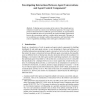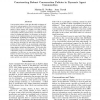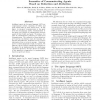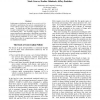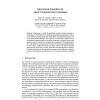124
click to vote
AGENTCL
2000
Springer
15 years 5 months ago
2000
Springer
The process of cooperative problem solving can be divided into four stages. First, finding potential team members, then forming a team followed by constructing a plan for that tea...
AGENTCL
2000
Springer
15 years 6 months ago
2000
Springer
Abstract. Exploring agent conversation in the context of fine-grained agent coordination research has raised several intellectual questions. The major issues pertain to interactio...
137
click to vote
AGENTCL
2000
Springer
15 years 6 months ago
2000
Springer
The ability to communicate is one of the salient properties of agents. Although a number of agent communication languages (ACLs) have been developed, obtaining a suitable formal se...
119
click to vote
AGENTCL
2000
Springer
15 years 6 months ago
2000
Springer
Conversation policies codify the allowable exchanges of speech acts among agents as they execute specific types of tasks. Both the set of agents in a community, and the nature of...
108
click to vote
AGENTCL
2000
Springer
15 years 6 months ago
2000
Springer
The author describes a system for defining conversation policies that allows conversants to exchange explicit representations of how they use messages to get things done. This sy...
107
click to vote
AGENTCL
2000
Springer
15 years 6 months ago
2000
Springer
Intelligent agents in the agent language 3APL are computational entities consisting of beliefs and goals which make up their mental state. In this paper, we integrate communicatio...
131
click to vote
AGENTCL
2000
Springer
15 years 6 months ago
2000
Springer
In this paper we define the concept of conversation policies: declarative specifications that govern communications between software agents using an agent communication language. ...
125
click to vote
AGENTCL
2000
Springer
15 years 6 months ago
2000
Springer
Abstract. In this paper, we study the operational semantics of agent communication languages.We develop a basic multi-agent programming language for systems of concurrently operati...
104
click to vote
AGENTCL
2000
Springer
15 years 6 months ago
2000
Springer
Conversations are a useful means of structuring communicative interactions among agents. The value of a conversation-based approach is largely determined by the conversational mod...

